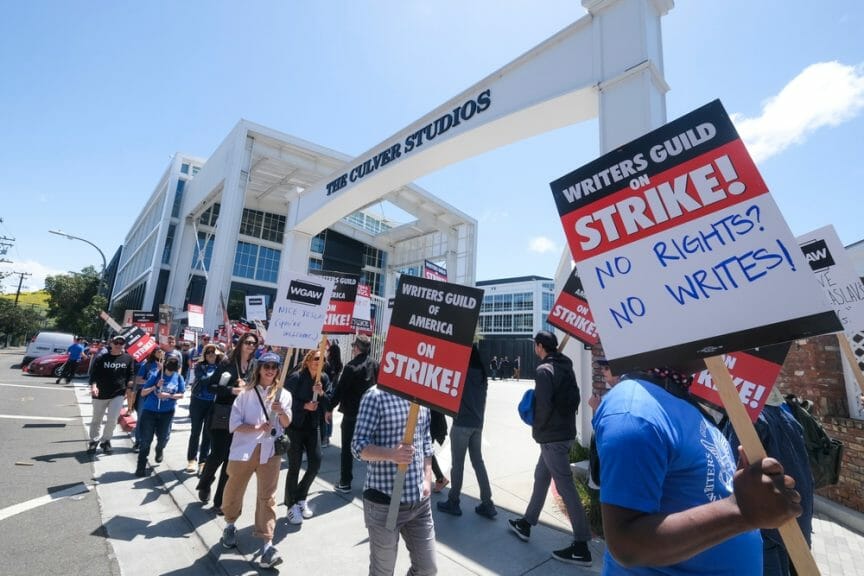The Writers Guild of America (WGA) strike has entered its 100th day, with writers in Los Angeles continuing their picket lines and protests outside major studios. The strike, which began on May 2, has seen writers steadfastly advocating for their rights and demanding fair working conditions within the entertainment industry.
Despite the challenges posed by the strike and the sweltering summer weather, writers have remained committed to their cause. Many have expressed gratitude for the support they have received from fellow writers, actors, and industry professionals, highlighting the sense of unity and purpose that has fueled their determination.
The strike has brought writers together on the picket lines, where they share stories, encouragement, and camaraderie. The shared experience of standing up for their rights has created a strong bond among participants, giving them the resilience to weather difficult days and celebrate small victories.
WGA leadership, including negotiating committee members, have expressed their appreciation for the writers who have shown up day after day to voice their concerns and advocate for change. The support from various industry figures, such as actors and fellow writers, has also been instrumental in boosting morale and amplifying the writers’ message.
The strike has not been without its challenges. Writers have faced issues such as safety concerns and aggressive drivers, but their determination to bring attention to their cause has not wavered. The strike has also been marked by creative and collaborative efforts, such as themed pickets and collaborations between different committees and unions.
As the strike continues, writers remain resolute in their pursuit of fair working conditions, better wages, and improved protections. Their commitment to each other and to future generations of writers is evident in their unwavering dedication to the picket lines and their willingness to support one another through the ups and downs of the strike.
Ultimately, the WGA strike serves as a testament to the power of collective action and the impact that organized efforts can have in bringing about change within the entertainment industry. Despite the challenges, writers’ determination and solidarity continue to shine as they fight for a more equitable and sustainable future for themselves and their colleagues.
The 100-day mark of the Writers Guild of America (WGA) strike is a significant milestone that underscores the writers’ resolve and their commitment to effecting meaningful change. The strike has shed light on the issues plaguing the industry, including fair compensation, improved working conditions, and better representation for underrepresented groups.
Throughout the strike, writers have harnessed their creativity not only in their work but also in their protests. Themed pickets, collaborations with other committees and unions, and efforts to raise awareness through social media and traditional media outlets have all contributed to the writers’ ability to amplify their message. The strike has become a platform for writers to voice their concerns not only for themselves but also for the future generations of storytellers.
While the strike has showcased the strength of solidarity among writers, it has also highlighted the stark disparities and challenges that persist within the entertainment industry. Issues of diversity, equity, and inclusion have been central to the discussions surrounding the strike, as writers advocate for more inclusive hiring practices and representation both in front of and behind the camera.
The support of actors, producers, and other industry professionals who have joined the picket lines or spoken out in solidarity has further underscored the significance of the writers’ cause. The strike has drawn attention to the importance of collaboration and allyship in driving systemic change.
As the strike continues, the path forward remains uncertain, but the writers’ determination remains steadfast. The 100-day mark serves as a reminder that the fight for fair treatment and a more equitable industry is ongoing and requires sustained effort. The writers’ resilience, creativity, and unity have demonstrated their capacity to make a lasting impact, not only on their own working conditions but on the broader landscape of the entertainment world.
Ultimately, the WGA strike is emblematic of the broader movements for workers’ rights, social justice, and systemic change that are taking place in various industries around the world. It is a testament to the power of collective action and the importance of standing up for what is just and equitable. As the strike continues, writers remain at the forefront of a larger movement for positive transformation, and their dedication to creating a more inclusive, fair, and sustainable entertainment industry is a testament to their unwavering commitment to their craft and their colleagues.














